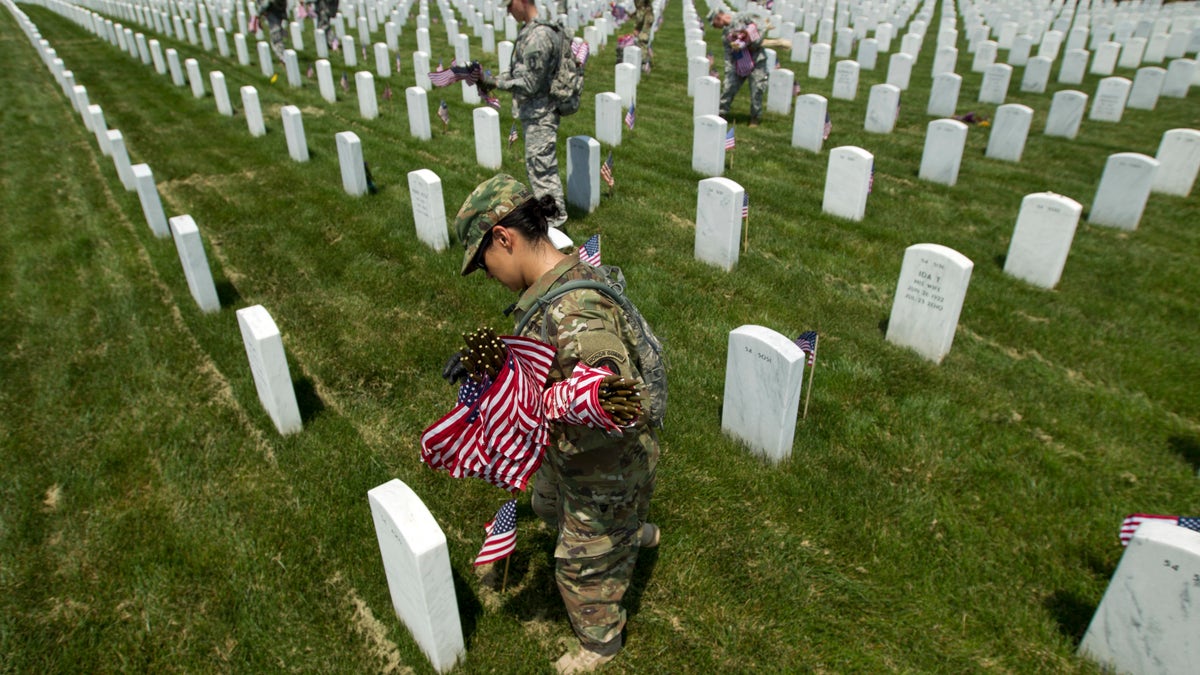
Members of the Old Guard with the Washington Memorial in the back, place flags in front of every headstone at Arlington National Cemetery in Arlington, Va., Thursday, May 26, 2016. Soldiers were to place nearly a quarter of a million American flags at the cemetery as part of a Memorial Day tradition. ( AP Photo/Jose Luis Magana)
Seventy-five years ago this Memorial Day—May 29, 1942—the classic thrice-Oscar-winning film "Yankee Doodle Dandy" (1942) premiered in New York City to great fanfare.
And, what a different time it was.
Or maybe not so different.
Like today, America was at war against a totalitarian menace, the brutal dictator Adolph Hitler. Now it is Islamic terrorists, like cancer cells throughout the world, bent on world domination, as exemplified by the ruthless attack a week ago today against young innocents in Manchester, England, killing 22, and the horrific attack, at week’s end, on Christian Coptic pilgrims in Egypt, killing 29, whom Pope Francis called “martyrs.” “A piecemeal World War III,” said the pope in 2014 of these ongoing assaults.
When "Yankee Doodle Dandy" was released, America’s sons and daughters were in harm’s way, prompting James Cagney, the film’s star, to lead the cast in frequent prayer on the set. Just like prayers are said on some Hollywood sets in response to today’s peril.
Many of Cagney’s fellow stars, like James Stewart, were playing real-life roles in defeating Hitler and fellow fascists. Stewart, commissioned a second lieutenant in the Army Air Force in ‘42, would fly twenty treacherous combat missions over Germany, eleven as squadron commander, rising to colonel by war’s end, while losing some of his men and suffering consequent hidden wounds. He “prayed a lot,” too, he told Johnny Carson over 40 years later. That’s about all he would say about his war experience.
Cagney and company were, of course, also singing America’s praises in the star-spangled film directed by German émigré Michael Curtiz about the life of renowned showman George M. Cohan (1878-1942).
Cohan graced America with his musical compositions, plays, acting, dancing and singing about all things great and American in a Broadway stage career that spanned some four decades starting in 1901, after hoofing it in his family’s vaudeville show.
His entertainment career was capped by a big comeback on June 29, 1936, when President Franklin Delano Roosevelt presented him with a Congressional Gold Medal for his contributions during World War I in building morale, especially through “You’re a Grand Old Flag” (1906) and “Over There”(1917). Cohan was inspired to write the latter song just as America was entering “the war to end all wars” that erupted 100 years ago last month, the PBS retrospective of which painted quite a different picture.
Besides these two classic songs, the film featured “The Yankee Doodle Boy” and “Give My Regards to Broadway,” both from the play “Little Johnny Jones” (1904), among other tributes to the American spirit. Cohan died on November 5, 1942, after the film had rocketed to success.
It was an idea, based on “Little Johnny Jones,” he pitched to Samuel Goldwyn, with Fred Astaire playing the lead. While Astaire demurred, it wasn’t long before Jack Warner, deeply affected by the war in Europe and looking for patriotic fare, approached Cohan. The rest, as they say, is history.
Yet, the film itself might have been history, but for Cohan’s wife Agnes. George M. had demanded non-negotiable final approval on the final film. But he deferred the decision to his wife, who, after watching it, reportedly turned to her husband and said, “Oh, you were so good, Georgie.”
Cagney’s prayers, both for film’s success and that of America in her campaign to defeat totalitarianism, were answered more than he could have hoped!
So, too, on this Memorial Day as we honor our fallen heroes, we pray for our nation—that, inside Hollywood and out, we might rise to the challenge these perilous times pose.
And, then some.








































